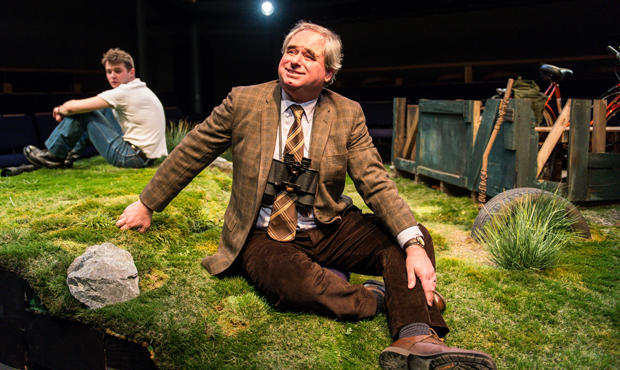German Skerries (Orange Tree Theatre)

© Manuel Harlan
Robert Holman's reputation is being restored. Since the Donmar Warehouse revived Making Noise Quietly four years ago, a new generation has picked up his plays – mostly quiet, pensive still-lifes – and found in them tenderness and truthfulness. German Skerries, revived by director Alice Hamilton and playwright Barney Norris, is no exception.
On a patch of Teeside clifftop – birds swooping overhead, boats chugging into harbour – two men look out through binoculars, watching the world from afar. One's a teacher named Martin, nearing retirement; the other's a newlywed, Jack, wasted in a menial job at a chemical plant. His watch has stopped. Typical of Holman's characters, the two men swap stories from the opposite ends of life.
It's a play about something bigger, though – about the overarching forces swirling around them. Martin (Howard Ward) moans about over-crowding at Salcombe, where he and his wife holiday; Jack (George Evans), about the unions battling against job loses, despite doing only two hours work on an eight-hour shift. On this clifftop, all peace and quiet, the world seems to go on around them: industry, shipping, cities and wildlife. Below, the German Skerries – rocks named after a World War Two plane crash – are a reminder of what might have been.
Jack comes back later that night, with his wife Carol (Katie Moore) – an adventure at the end of a date – only their evening's interrupted when an injured man, Michael (Henry Everett), climbs out of the sea.
It's a prophetic piece. Set in 1977, the year it was written, just before Thatcher's policies ripped through this industrial region, it also somehow presages the recent collapse of British steel. In the distance, a new steel plant has opened, and its cooling pipe is spewing out boiling water into the sea, pushing the seabirds out. Though not a climate change play per se, Holman's attuned to the continuum of the economy and the ecology. Martin knows Teeside needs jobs as well as birds, but our every action has an effect.
That plays out on a personal level too, and Holman's play is perhaps most eloquent on the longshore drift of marriage. Its older men huff about their wives – Martin fondly, Michael frustratedly – and they come to the cliffs to escape being nagged. The young couple might coo and cuddle now, but you see the first shoots of that future in Jack's unthinking selfishness and immaturity, and in Carol's determined patience. When he badgers her for nookie, she bats him gently away. Over time, you suspect that they'll fray – but Holman lets them have this moment regardless, rolling around on the grass.
Tonally, it has something of an old Ken Loach film – the sort that tracks a flock of starlings on a grey sky. You breath in the Teeside landscape, rugged and exposed, and Hamilton's production lets you feel the wind's chill and the sun's warmth.
James Perkins' patch of grass is near-perfect, with its worn path and lose pebbles, tufts and tyres. You slip into the setting quite easily, as if a chunk of coastline had landed, asteroid-like, in the middle of Richmond. Simon Gethin Thomas catches the light eloquently. When a cormorant performs a fly-by, a trill of woodwind catches its flight. It's beautifully acted all-round, with small actions speaking volumes: Moore's silent generosity, picking the grass off her husband's back; Evans' head-first bluster, snatching his jacket back for a fag; Ward's sage shrug that sees the way the world's heading, but knows how powerless we are to stop it.
German Skerries runs at the Orange Tree Theatre until 2 April and then tours to Reading, Scarborough, Lancaster and Hull.










